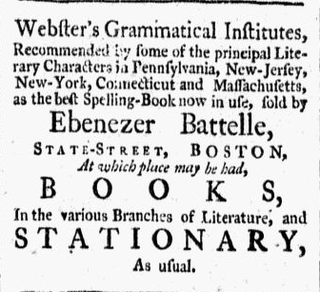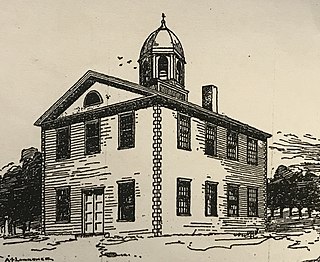Related Research Articles

The Alien and Sedition Acts were a set of four laws enacted in 1798 that applied restrictions to immigration and speech in the United States. The Naturalization Act of 1798 increased the requirements to seek citizenship, the Alien Friends Act of 1798 allowed the president to imprison and deport non-citizens, the Alien Enemies Act of 1798 gave the president additional powers to detain non-citizens during times of war, and the Sedition Act of 1798 criminalized false and malicious statements about the federal government. The Alien Friends Act and the Sedition Act expired after a set number of years, and the Naturalization Act was repealed in 1802. The Alien Enemies Act, as amended, is still in effect as 50 U.S.C. ch. 3.

Dedham is a town in, and the county seat of, Norfolk County, Massachusetts, United States. Located on Boston's southwestern border, the population was 25,364 at the 2020 census.

The Espionage Act of 1917 is a United States federal law enacted on June 15, 1917, shortly after the United States entered World War I. It has been amended numerous times over the years. It was originally found in Title 50 of the U.S. Code but is now found under Title 18 : 18 U.S.C. ch. 37.

Fisher Ames was a Representative in the United States Congress from the 1st Congressional District of Massachusetts. He was an important leader of the Federalist Party in the House, and was noted for his oratorical skill.
Sedition is overt conduct, such as speech or organization, that tends toward rebellion against the established order. Sedition often includes subversion of a constitution and incitement of discontent toward, or insurrection against, established authority. Sedition may include any commotion, though not aimed at direct and open violence against the laws. Seditious words in writing are seditious libel. A seditionist is one who engages in or promotes the interest of sedition.

Fries's Rebellion, also called House Tax Rebellion, the Home Tax Rebellion and, in Pennsylvania German, the Heesses-Wasser Uffschtand, was an armed tax revolt among Pennsylvania Dutch farmers between 1799 and 1800. It was the third of three tax-related rebellions in the 18th century United States, the earlier two being Shays' Rebellion and the Whiskey Rebellion. It was commemorated in 2003 with a Pennsylvania historical marker erected in Quakertown, Pennsylvania, where it first erupted.

The Sedition Act of 1918 was an Act of the United States Congress that extended the Espionage Act of 1917 to cover a broader range of offenses, notably speech and the expression of opinion that cast the government or the war effort in a negative light or interfered with the sale of government bonds.
Abrams v. United States, 250 U.S. 616 (1919), was a decision by the Supreme Court of the United States upholding the criminal arrests of several defendants under the Sedition Act of 1918, which was an amendment to the Espionage Act of 1917. The law made it a criminal offense to criticize the production of war materiel with intent to hinder the progress of American military efforts.

A liberty pole is a wooden pole, or sometimes spear or lance, surmounted by a "cap of liberty", mostly of the Phrygian cap. The symbol originated in the immediate aftermath of the assassination of the Roman dictator Julius Caesar by a group of Rome's Senators in 44 BCE. Immediately after Caesar was killed the assassins, or Liberatores as they called themselves, went through the streets with their bloody weapons held up, one carrying a pileus carried on the tip of a spear. This symbolized that the Roman people had been freed from the rule of Caesar, which the assassins claimed had become a tyranny because it overstepped the authority of the Senate and thus betrayed the Republic.
David Brown was convicted of sedition because of his criticism of the United States federal government and received the harshest sentence for anyone under the Sedition Act of 1798 for erecting the Dedham Liberty Pole.
Seditious conspiracy is a crime in various jurisdictions of conspiring against the authority or legitimacy of the state. As a form of sedition, it has been described as a serious but lesser counterpart to treason, targeting activities that undermine the state without directly attacking it.

Ebenezer Battelle (1754–1815) was an American Revolutionary War veteran, a bookseller in Boston, Massachusetts, and a settler of Marietta, Ohio, in the late 18th century.

The history of Dedham, Massachusetts from 1700 to 1799 saw the town become one of the largest and most influential country towns in Massachusetts. As the population grew and residents moved to outlying areas of the town, battles for political power took place. Similar battles were taking place within the churches, as liberal and conservative factions bristled at paying for ministers with whom they had differences of theological opinion. New parishes and preciencts were formed, and eventually several new towns broke away.
Major Abijah Draper was a military officer under George Washington and prominent resident of Dedham, Massachusetts.

The Norfolk County Courthouse served Norfolk County, Massachusetts from soon after its establishment in 1792 until 1827. It was replaced by a new Norfolk County Courthouse. In later years, the building was known as Temperance Hall.
Thomas Thatcher was the third minister of the West Church of Dedham, Massachusetts.

This is a timeline of the history of the town of Dedham, Massachusetts.

The death of Elizabeth Fales took place on May 18, 1801, in Dedham, Massachusetts. Her boyfriend, Jason Fairbanks, was convicted of the murder and sentenced to death but escaped from jail before he could be hanged. He was recaptured, returned to Dedham, and hanged before a crowd of 10,000. The case made national headlines.

The Dedham Liberty Pole was a liberty pole erected in 1798 in Dedham, Massachusetts. Several of those involved with the pole were arrested, resulting in both the harshest, and the lightest, sentences ever imposed under the Sedition Act of 1798.
References
- 1 2 3 Slack 2015, p. 179.
- 1 2 3 Phillip I. Blumberg (30 September 2010). Repressive Jurisprudence in the Early American Republic: The First Amendment and the Legacy of English Law . Cambridge University Press. p. 134. ISBN 978-1-139-49002-3.
- ↑ Slack 2015, p. 140.
- 1 2 3 4 Slack 2015, p. 138.
- ↑ Slack 2015, p. 141.
- 1 2 3 Richard N. Rosenfeld; Edmund S. Morgan (15 September 1998). American Aurora: A Democratic-Republican Returns: The Suppressed History of Our Nation's Beginnings and the Heroic Newspaper That Tried to Report It. St. Martin's Press. p. 541. ISBN 978-0-312-19437-6.
- 1 2 3 Slack 2015, p. 178.
- 1 2 Belt, Gordon T. "Sedition Act of 1798 – a brief history of arrests, indictments, mistreatment & abuse" (PDF). First Amendment Center. Retrieved October 25, 2016.
- ↑ Slack 2015, p. 232.
- ↑ Worthington, Erastus (1827). The history of Dedham: from the beginning of its settlement, in September 1635, to May 1827. Dutton and Wentworth. p. 79-81. Retrieved November 8, 2019.